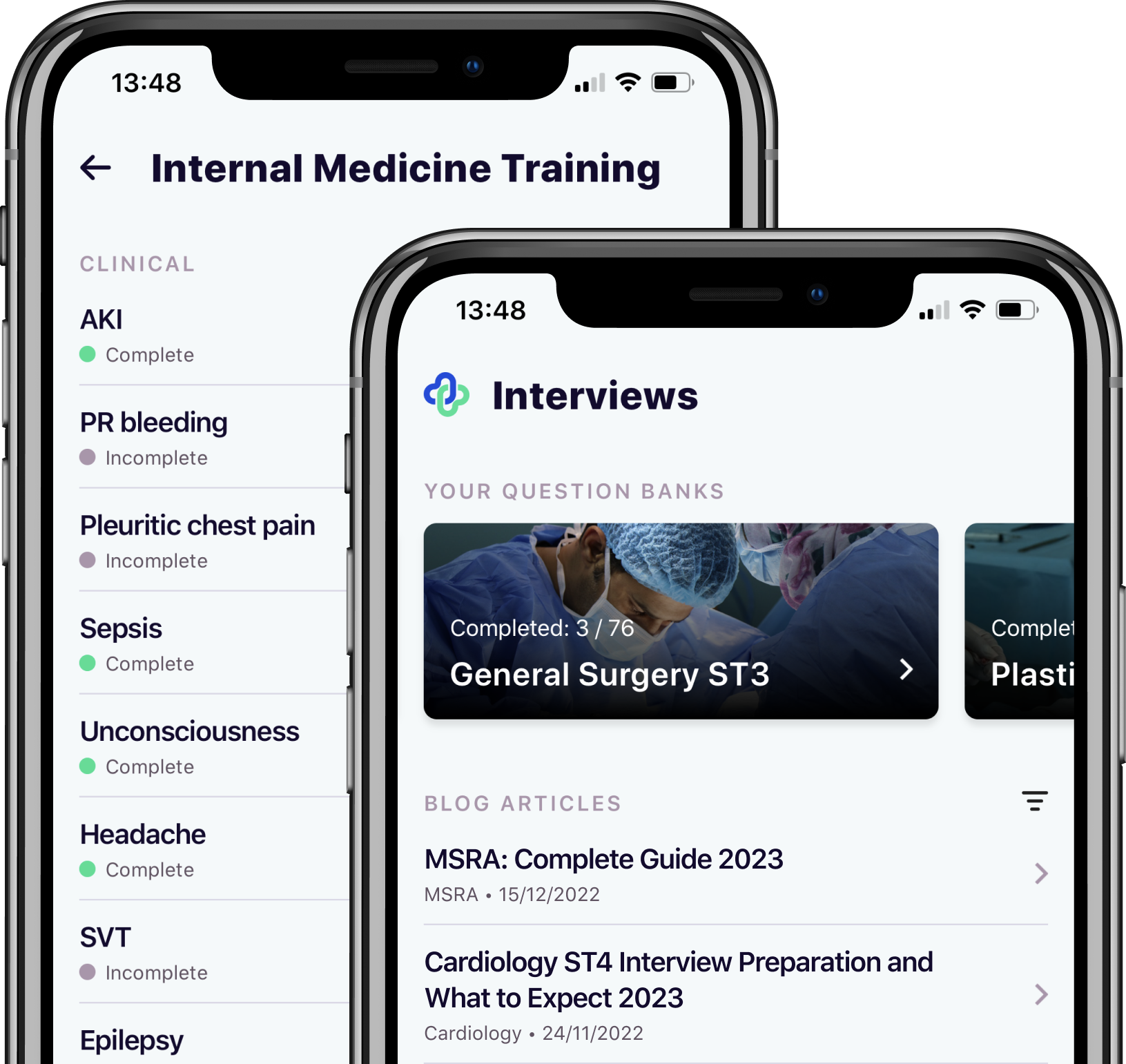
Ophthalmology ST1 Interview Evidence Folder Preparation: 2025 Guide
The ST1 Ophthalmology Evidence Folder is a key component of the selection process. This guide will provide everything you need to know about the domains included and what evidence to provide for each to ensure you score the maximum points available to you.
There are strict criteria and a stringent mark scheme for your evidence folder, and with up to 50 points available, out of a total of 100 for all elements of the application process, it is worth spending time preparing it. To help you do well in the rest of the interview, we’ve designed our Ophthalmology ST1 Interview Question Bank, which includes example interview questions and tips on how to answer them from previously high-scoring Ophthalmology trainees.
To learn more about the 2025 application and selection process for Ophthalmology ST1, including the key dates, MSRA requirements and the interview format, visit our complete guide.
When organising your evidence folder, structure it according to the guidelines published on the Severn website. Remember, interviewers will be going through hundreds of anonymous evidence folders, so it is vital your folder is well organised. The following is a breakdown of the various domains included in the evidence folder and what you can score points for.
List of previous posts
This section will not be scored, but it’s essential that you provide a full list of your previous posts.
Qualifications with certificates or letter of proof (cumulative scoring – maximum 5 points)
Points are available for the following:
- 1 point – per qualification – MSc, BSc, PG Cert
- 3 points – for an MD or MPhil degree taken as a separate course
- 4 points – for a completed PhD or DPhil, including full-time research usually lasting 3 years’ duration.
No points are awarded for completing the MRCP and MRCS, or for a Diploma in Child Health.
It is important to be strategic when opting for particular degrees or postgraduate exams. Having a BSc or MSc gets you a point each at interview, but they also give you opportunities to gain points elsewhere as the work you do during them generates presentations, publications, prizes and bursaries. Additionally, for postgraduate exams, there are some potentially easier points to be gained than others. For example, passing FRCOphth Part 1 scores three points (see ‘Ophthalmology specialty links and commitment ’ section below); however, passing the MRCP no longer scores you points. With this in mind, it is a better use of your time to do the FRCOphth part 1 in your Foundation Year 1 or 2, rather than inefficiently spending time on passing all parts of the MRCP exam.
Prizes/Awards with proof (cumulative scoring – maximum 6 points)
As an undergraduate, ranking within the top 60% of the Duke Elder exam will give you 0.5 points; coming top 10% will give you 2 points. Bear in mind that obtaining an Honours Medical degree or 1st in your undergraduate degree counts as an award. Foundation schools offer awards to Foundation doctors for ‘teaching’ or ‘best audit of the year’, and these are just as valuable as prizes at international meetings or conferences. Other examples of merit can include bursaries or funding for research, grants or electives.
A full list of the points available for prizes/awards is as follows:
- 3 points – for Crombie Medal (stood 1st in FRCOphth part 1 exam)
- 2 points – 1st in final undergraduate degree
- 0.5 points each – for “best” presentation or poster at a national or international meeting, successful research grant application
Points are also available for a National Undergraduate prize through competitive examination (in any specialty). The example given is The Duke-Elder prize, for which the following points are awarded:
- 2 points – coming in the top 10% of entrants
- 0.5 points – being in the top 60% (or a pass in 2016 or earlier exam sittings)
- 0.5 points each – successful research grant application where you were lead author and the application led to peer-reviewed published research.
- 0.5 points each (max 2 points) – for each prize/distinction/merit related to parts of the medical or dental course or Foundation Programme awarded to no more than the top 20% of students and doctors.
Ophthalmology specialty links and commitment to date as a career (cumulative scoring – maximum 12 points)
The following points are available for Ophthalmology links and commitment to the specialty:
- 2 points – Refraction Certificate
- 3 points – FRCOphth Part 1
- 2 points (max) – Non-peer reviewed publications (0.5 points each) & case reports (1 point each) or other research publications in ophthalmology. These must not be included in other sections.
- 2 points max – Ophthalmic elective and/or separate undergraduate project. 1 point is available per achievement.
- 1 point max – Taster week
- 1 point max – Attending ophthalmology clinics and theatre sessions. This must be outside of a formal taster week and include a minimum of 10 sessions with dates & supervisor-signed evidence.
- 1 point max – EyeSi assessments (minimum 4 hours).
- 1 point max – Evidence of other ophthalmology simulation training
- 3 points max – Meetings attended, including:
- 3 points max for National / International Ophthalmology educational meetings attended (1 point per meeting)
- 1 point max for Regional Ophthalmology meetings attended (0.5 points per meeting)
- There is also a discretionary 2 point max available for evidence not included in the list above (not including taking Duke-Elder or WBAs).
There are lots of points to be gained in this section, so it’s worthwhile planning ahead and trying to maximise your marks here. The following are some ideas of how to achieve this.
Try to organise an ophthalmology medical elective, which can either be a clinical placement, a research elective or a mixture of both. The key to getting the most out of your elective is to plan early. Renowned eye units such as Moorfields Eye Hospital in London or Wills Eye Hospital in Philadelphia have established visiting schemes open for applications every quarter of the year. Many research institutions, such as Harvard University and UCL Institute of Ophthalmology, offer small projects for visiting students, but they require at least 6 months to 1 year of preparation in advance. Once you have your elective arranged, try applying for an elective bursary award, e.g. Patrick Trevor-Roper Travel Award by RCOphth, Student Elective Award by RCPSG, etc.
Apply to undertake a taster week at your local ophthalmology department during your foundation years. This also lets you experience what ophthalmologists do and what training is like. Make sure you get a letter from a consultant as evidence of your taster week.
The EyeSi Surgical Simulator by VR Magic is a virtual reality simulator for intraocular surgical training available at most ophthalmology units throughout the United Kingdom. Any ophthalmology trainee should be able to point you in the right direction to access this. There is also an EyeSi at the Royal College of Ophthalmology, and you can contact them directly to arrange a login. If you complete the basic modules, you can generate a certificate, which you can also upload as “Commitment to Specialty”.
Ophthalmology related courses and workshops are easy ways of building your evidence folder. Some useful ones are:
- Microsurgical skills course, Royal College of Ophthalmologists
- FOCUS (Foundation Course in Ophthalmology), Edinburgh
- Ophthalmology Summer School, UCL Institute of Ophthalmology
- Tropical Ophthalmology, London School of Hygiene and Tropical Medicine
Multi-Source Feedback (MSF) (maximum 3 points)
The following points are available for MSF:
- 0 points – for significant negative comments
- 1 point – minor negative comments or non-satisfactory scores
- 2 points – satisfactory scores with appropriate good comments
- 3 points – satisfactory scores with multiple superlative positive comments
Your MSF must have taken place within 18 months of the interview date if you have been in a clinical post for this period. If this doesn’t apply to you, you should include your MSF from your most recent clinical post. You can find more information about the requirements for MSF evidence here.
Publications (maximum 6 points)
Points are awarded for publications in any speciality and do not have to be Ophthalmology-specific. According to the most recent guidance, your evidence should be a list of peer-reviewed original research publications with a photocopy of the first page of each paper. Marks for publications are awarded based on your authorship status.
The points will be awarded:
- 3 points – for each publication where you are first author or joint first author
- 1 point – for any other publications up to fourth author
No points are awarded if you are the fifth author or lower in the citation. Likewise, no points are given for case reports; these can be evidenced in the “Ophthalmology specialty links and commitment to date as a career” section if they are Ophthalmology based.
Quality improvement / Audit projects (maximum 5 points)
You are asked only to include your best audit/QIP project in your evidence folder, therefore, there is no gain in spending time and effort doing extra audits/QIPs which you may not need. “Best” usually implies having to close the loop of an audit cycle (re-auditing the clinical practice after implementation of change) and effecting a significant improvement in clinical practice. Thus, it is wise to focus on simple audits and QIPs where data can be easily collected and analysed.
You will be awarded points for the following:
- 0 points – if there is no evidence of QI/audit work.
- 1 point – for participation but no specific roles documented or specific format followed.
- 2 points – for initiation and design of the QIP / audit and some evidence of specific format
- 3 points – for initiation, design and writing up the QIP / audit and specific format followed.
- 4 points – as above and was personally involved in implementing the QI strategy / completing the audit loop and implementing change
- 5 points – for published audit or QI guidelines implemented supra-regionally.
Be aware that these points can be changed depending on the quality of the project and the impact of the work.
Presentations (maximum 6 points)
Try to submit your work to international conferences as these score more points than local conferences. These do not have to be Ophthalmology specific. Do apply for bursaries to fund your conference attendance, as these count as “Prizes” in your evidence folder. Start early at medical school if you can, as universities are generally much more generous with funding and bursaries than the local hospital or Health Education England.
Remember to keep a copy of the programme booklet with your work highlighted, as this can be used as evidence.
You can gain points for the following:
- 1 Point – Regional presentations
- 2 Points – National presentations
- 3 Points – International meetings
Note, these points refer to oral presentations only, for which you are the first author. For poster presentations, you’ll be awarded half marks. Likewise, if you are the second author or lower, you’ll score half of the oral presentation or poster points. For example, you would score 0.5 points for a poster at a national meeting if you were second author or lower.
If you present the same paper at different meetings, you’ll receive points for the highest-ranking meeting only.
You can also receive points for accepted presentations that have not yet been presented, so it is worth including them in your evidence.
Education and Teaching (maximum 5 points)
There are points for writing a chapter in a textbook, designing an educational course or e-learning tool, completing a course like the Medibuddy Teach the Teacher course, having a formal role in examining undergraduates and for a higher teaching qualification, such as a Diploma, Certificate or Masters in medical education.

Teach the Teacher Course by Medibuddy
This two-day CPD-accredited online course will earn you 12 CPD points on completion. It’s entirely flexible, so you can complete it in two days or multiple sessions over a longer period. On completion of the course, you’ll receive a certificate for your portfolio that is accredited for CCT, interviews and appraisals.
Find out moreOn top of ad-hoc bedside teaching and occasional small group teaching in the NHS setting, try and organise your own regional teaching course on any subject. You would need participants from more than one University / Hospital to qualify your teaching course as regional. For any form of teaching, do get feedback forms from the attendees. It is best to summarise all the feedback gathered and present this neatly in your evidence folder. You could write short reflective pieces on your teaching to demonstrate your professional development.
To be formally involved with examining undergraduates, most universities welcome junior doctors to assist in examining undergraduate OCSE examinations. If you know of academics or clinicians who are in touch with publishers, always ask if you could contribute a chapter for a textbook or course book.
A full breakdown of the points available for education and teaching are as follows:
- 0.5 point each – for helping with an educational course, designing an educational course or e-learning tool, writing an e-book, completing a “teaching the teachers” course, formal role in examining undergraduates
- 1 point – contributing to at least 3 teaching sessions over at least 3 months with formal feedback
- 2 points – for writing a chapter in a textbook (not an e-book)
- 2 points – for a Higher teaching qualification, e.g. a Diploma, Certificate or Masters in Medical Education
- 3 points – for writing a book (not an e-book)
Overall portfolio layout & quality (maximum 3 points)
Three points are available for the layout, organisation and quality of how your evidence folder is presented. So, in addition to making it easier for the assessors to award you points for all sections, ensuring your evidence folder is well-organised and to a high standard will also gain you extra points!
Last words
Preparing a good quality evidence folder will be useful in any specialty you apply for. The best tip is to start early and get organised (months in advance!), as filing and gathering evidence will always take longer than you think. Then when it comes to your interview, remember to check out our Ophthalmology ST1 Interview Question Bank, which features patient consultation scenarios and advice on how to answer them.
Further Reading

Take your subscriptions with you
Our mobile app allows you to access your interview and exam question banks wherever you are.




